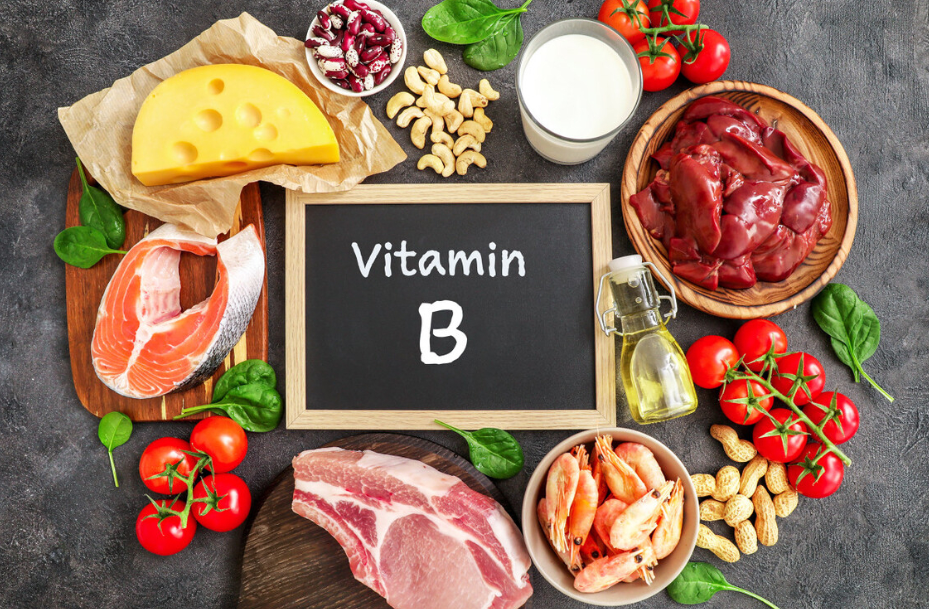Vitamin B are essential nutrients for the human body. Not only are there many members, each of them is highly capable, but they have also produced 7 Nobel Prize winners.
Recently, a new study published in Nutrients, a famous journal in the field of nutrition, showed that moderate supplementation of B vitamins is also associated with a reduced risk of type 2 diabetes.
Vitamin B are a large family, and the most common ones are 8 types, namely:
Vitamin b1 (Thiamine)
Vitamin b2 (Riboflavin)
Niacin (Vitamin b3)
Pantothenic Acid (Vitamin b5)
Vitamin b6 (Pyridoxine)
Biotin (Vitamin b7)
Folic Acid (Vitamin b9)
Vitamin b12 (Cobalamin)
In this study, the School of Public Health of Fudan University analyzed the intake of B vitamins, including B1, B2, B3, B6, B9 and B12, of 44,960 participants in the Shanghai Suburban Adult Cohort and Biobank (SSACB), and analyzed inflammatory biomarkers through blood samples.
Analysis of single vitamin B found that:
Except B3, the intake of vitamins B1, B2, B6, B9 and B12 is associated with a lower risk of diabetes.
Analysis of complex vitamin B found that:
Higher intake of complex vitamin B is associated with a 20% lower risk of diabetes, among which B6 has the strongest effect on reducing the risk of diabetes, accounting for 45.58%.
Analysis of food types found that:
Rice and its products contribute the most to vitamins B1, B3 and B6; fresh vegetables contribute the most to vitamins B2 and B9; shrimp, crab, etc. contribute the most to vitamin B12.
This study on the Chinese population showed that supplementing B vitamins is associated with a lower risk of type 2 diabetes, among which B6 has the strongest effect, and this association may be partly mediated by inflammation.
In addition to the above-mentioned B vitamins being associated with diabetes risk, B vitamins also involve all aspects. Once deficient, they may cause fatigue, indigestion, slow reaction, and even increase the risk of multiple cancers.
• What Are The Symptoms Of Vitamin B Deficiency?
B vitamins have their own characteristics and play unique physiological roles. Lack of any one of them may cause harm to the body.
Vitamin B1: Beriberi
Vitamin B1 deficiency can cause beriberi, which manifests as lower limb neuritis. In severe cases, systemic edema, heart failure and even death may occur.
Supplement sources: beans and seed husks (such as rice bran), germ, yeast, animal offal and lean meat.
Vitamin B2: Glossitis
Vitamin B2 deficiency can cause symptoms such as angular cheilitis, cheilitis, scrotitis, blepharitis, photophobia, etc.
Supplement sources: dairy products, meat, eggs, liver, etc.
Vitamin B3: Pellagra
Vitamin B3 deficiency can cause pellagra, which is mainly manifested as dermatitis, diarrhea and dementia.
Supplement sources: yeast, meat, liver, cereals, beans, etc.
Vitamin B5: Fatigue
Vitamin B5 deficiency can cause fatigue, loss of appetite, nausea, etc.
Supplement sources: chicken, beef, liver, cereals, potatoes, tomatoes, etc.
Vitamin B6: Seborrheic dermatitis
Vitamin B6 deficiency can cause peripheral neuritis, cheilitis, glossitis, seborrhea and microcytic anemia. The use of certain drugs (such as the anti-tuberculosis drug isoniazid) may also cause its deficiency.
Supplementary sources: liver, fish, meat, whole wheat, nuts, beans, egg yolks and yeast, etc.
Vitamin B9: Stroke
Vitamin B9 deficiency can lead to megaloblastic anemia, hyperhomocysteinemia, etc., and deficiency during pregnancy can lead to birth defects such as neural tube defects and cleft lip and palate in the fetus.
Supplementary sources: rich in food, intestinal bacteria can also synthesize it, and green leafy vegetables, fruits, yeast and liver contain more.
Vitamin B12: Anemia
Vitamin B12 deficiency can lead to megaloblastic anemia and other diseases, which are more common in people with severe malabsorption and long-term vegetarians.
Supplementary sources: widely present in animal foods, it is only synthesized by microorganisms, rich in yeast and animal liver, and does not exist in plants.
Overall, vitamin B are commonly found in animal offal, beans, milk and eggs, livestock, poultry, fish, meat, coarse grains and other foods. It should be emphasized that the above-mentioned related diseases have many causes and are not necessarily caused by B vitamin deficiency. Before taking B vitamin drugs or health products, everyone must consult a doctor and pharmacist.
Usually, people with a balanced diet generally do not suffer from B vitamin deficiency and do not need additional supplements. In addition, B vitamins are water-soluble, and excessive intake will be excreted from the body with urine.
Special tips:
The following situations may cause vitamin B deficiency. These people can take supplements under the guidance of a doctor or pharmacist:
1. Have bad eating habits, such as picky eating, partial eating, irregular eating, and deliberate weight control;
2. Have bad habits, such as smoking and alcoholism;
3. Special physiological states, such as pregnancy and lactation, and children's growth and development period;
4. In certain disease states, such as decreased digestion and absorption function.
In short, it is not recommended that you blindly supplement with drugs or health products. People with a balanced diet generally do not suffer from B vitamin deficiency.
• NEWGREEN Supply Vitamin B 1/2/3/5/6/9/12 Powder/Capsules/Tablets


Post time: Oct-31-2024







